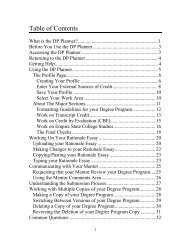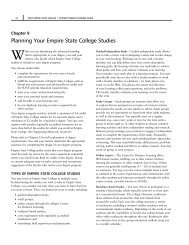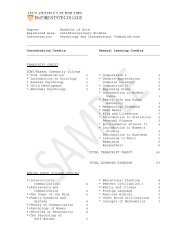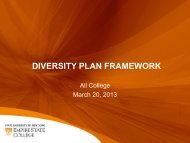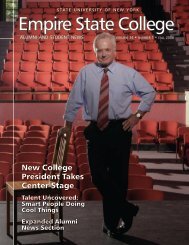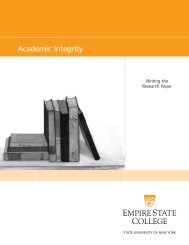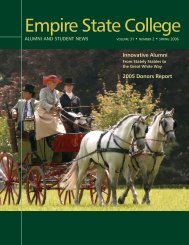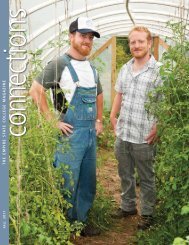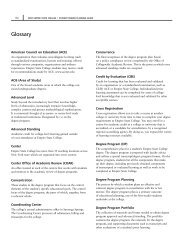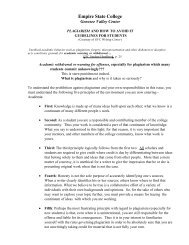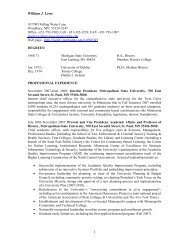Academic Plan 2011-2015 (PDF 524kB) - SUNY Empire State College
Academic Plan 2011-2015 (PDF 524kB) - SUNY Empire State College
Academic Plan 2011-2015 (PDF 524kB) - SUNY Empire State College
You also want an ePaper? Increase the reach of your titles
YUMPU automatically turns print PDFs into web optimized ePapers that Google loves.
<strong>SUNY</strong> <strong>Empire</strong> <strong>State</strong> <strong>College</strong>: <strong>Academic</strong> <strong>Plan</strong> <strong>2011</strong> - <strong>2015</strong> 43where higher education is more available. As a result, the program has been particularly suitable forwomen students who may have been denied opportunities. The International Programs faculty andstaff have proposed expansion in Central and South America. There also are opportunities to partnerwith other <strong>SUNY</strong> schools for completion of a two-year degree in the home country, one year at adistance with <strong>Empire</strong> <strong>State</strong> <strong>College</strong> and one year in residence at another <strong>SUNY</strong> campus. The Schoolfor Graduate Studies has several emergent programs with a strong global perspective. Increasedconcentrations and residencies integrating global and international perspectives are an opportunityto expanding the career interests of our students. <strong>Empire</strong> <strong>State</strong> <strong>College</strong> also may be suited ideallyto blending opportunities where students work or volunteer internationally, and complete degreesat a distance.Environmental SustainabilityDescriptionEnvironmental sustainability as an academic theme is the study of any one or a combination of someof the many factors that contribute to environmental deterioration or to environmental improvement.Factors that impact sustainability range from energy policy to food consumption, from recycling totransportation, from individual choices to the global economy. Clearly we could name more factors, butthe point is obvious: the study of environmental sustainability includes a vast range of critical issues.ScopeThe possibilities for academic studies that focus on environmental sustainability are almost numberless.In fact, the theme easily fits into all of <strong>Empire</strong> <strong>State</strong> <strong>College</strong>’s areas of study, whether as a focusfor a student-designed concentration or as a topic of study that strengthens such a concentration.Some instances are obvious: For degree programs in Science, Mathematics and Technology, forexample, a study of global climate change demonstrates the broader context in which science andtechnology operate. And to stay with that same topic, policy studies related to it can play a significantrole in political science, public policy, science and business programs. In business and labor studies,environmental sustainability is already an important component of many degree programs, and it isrecognized increasingly as a necessary component of strategic planning, economic analysis and productdevelopment. Environmental justice is one of several avenues through which human services programsexamine this theme.Other instances, though perhaps less obvious, are nevertheless significant. Arts degree programs canexamine the relationship between how art is conceived, planned, designed, delivered and supportedfrom an environmental perspective, and the environment can be an artistic theme itself. Literatureprograms can examine how nature and environmental degradation are presented in literature and/or analyze nature literature. History, philosophy, education, social sciences, human development –all these general areas have important environmental sustainability dimensions.The college already promotes this theme in its academic program: We have a long standing andsuccessful Environmental Studies Residency, with a new Urban Environmental Studies Residencymaking its debut this year. There are still other ideas among faculty for residencies that focus onsustainability itself. Looking to the future, the Environmental Sustainability Committee plans todevelop workshops to support and encourage faculty in designing sustainability-related coursesand course modules. In addition, the college can (should) include environmental sustainability



